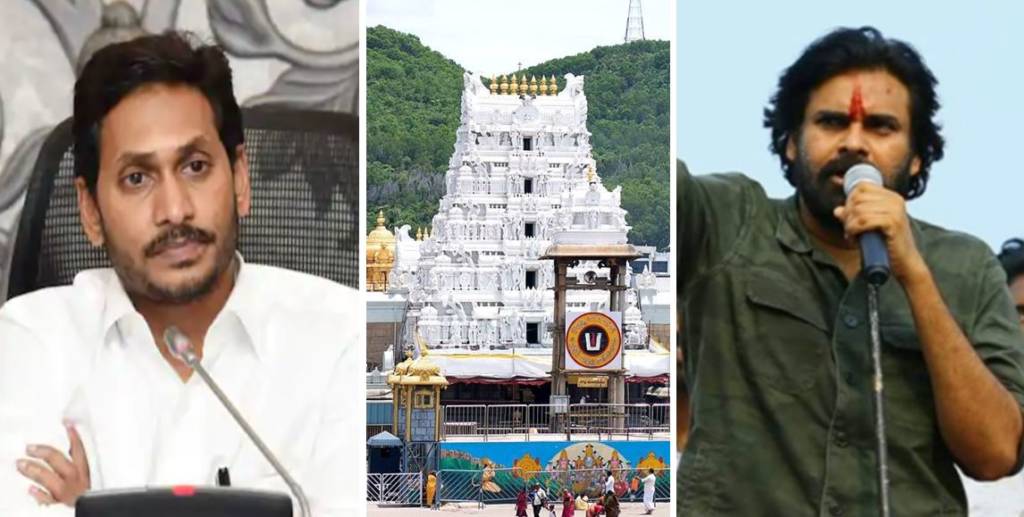The Tirumala Tirupati Devasthanam (TTD) Board, like all other temple boards across the country, suffers from the clutches of brazen state control, constitutionally so. In this line, the TTD’s proposal (or decision rather) to sell off close to 50 immovable assets across various states has drawn the ire of devotees, who have been contributing to the temple out of their faith, not for such contributions to be referred to as “non-remunerative” by the state-controlled Board.
Y V Subba Reddy, the Chairman of the TTD Board Trust, who also happens to be the maternal uncle of sitting Andhra Pradesh CM, Jagan Mohan Reddy, said that the temple board was well within its rights to sell the immovable properties via a public auction. Strong backlash from Pawan Kalyan and the Hindu devotees has now led to the Jagan government taking a step back on the decision.
Jana Sena Party Chief, Pawan Kalyan has risen to the occasion and strongly opposed the proposal of selling temple properties by a board that is clearly controlled by the state government. “If TTD sells away land, this shall set a bad precedent and even other Hindu Religious institutions might imitate it. This shall also hurt the sentiments and beliefs of millions of devotees.”
If TTD sells away land, this shall set a bad precedent and even other Hindu Religious institutions might imitate it. This shall also hurt the sentiments and beliefs of millions of devotees.
— Pawan Kalyan (@PawanKalyan) May 25, 2020
Hurting the devotee’s sentiment & belief and risking the economic opportunities for the state in the future, it would be a grave mistake if the YCP led state government lets TTD sell off the lands in the prevailing circumstances.
— Pawan Kalyan (@PawanKalyan) May 25, 2020
Pawan Kalyan also called upon all devotees of Lord Balaji to participate in a hunger strike against the TTD’s proposed decision of selling 50 immovable assets, donated by devotees. BJP MP Tejaswi Surya too called upon Pawan Kalyan to fight the issue tooth and nail.
AP Govt’s decision to sell assets of Tirupati Devasthanam is highly deplorable. We must oppose this tooth & nail.
I request Sri @PawanKalyan Garu & BJP in AP to fight this issue until the govt reverses it’s stand.
In the longterm, we must get temples out of state control.
— Tejasvi Surya (ಮೋದಿಯ ಪರಿವಾರ) (@Tejasvi_Surya) May 25, 2020
Hindus have sided largely with Pawan Kalyan, as the state government’s push for selling temple lands, while making it appear as though it was the TTD’s sovereign decision to do so, has not gone down well with many. YS Jagan Mohan Reddy’s explicit pro-Christian stance, in any case, has always been a thorn to bear for the state’s Hindus. Now that Pawan Kalyan has emerged as a force to reckon with, as he was able to bring all Hindus under one umbrella, the Jagan government has much to fear.
Facing immense backlash for its deplorable push of selling temple properties which it considers “non-remunerative”, the government of Andhra Pradesh yesterday directed the TTD to rethink its stance on the issue, effectively telling the temple board to keep such proposals in abeyance. “Keeping in view the sentiments of devotees, the government hereby directs TTD to re-examine the issue in consultation with different stakeholders like religious elders, opinion makers, section of devotees etc.,” a government order said.
#BreakingNews Good news for devotees of Lord Balaji! @ysjagan Andhra Pradesh Govt takes back it’s decision to sell lands donated to Lord Balaji – TTD by issuing GO 888.
This is the victory of Secularism over communalism!!#TTDNotForSale pic.twitter.com/of9QGkmOxC
— Priti Gandhi (Modi ka Parivar) (@MrsGandhi) May 25, 2020
The Tirumala Tirupati Devasthanam is not the first temple board to be increasingly facing the brunt of brazen state control. Earlier, close to 47 major temples of Tamil Nadu were asked to cough up a total of 10 crore rupees as ‘contribution’ to the CM’s relief fund.
Only this month, the Communist government of Kerala brazenly extracted a sum of Rs. 5 crore from the corpus of the Guruvayur Devaswom Board, despite most temples in Kerala and the country too, facing a cash crunch owing to the nationwide lockdown. How were they capable of doing so? Here’s the answer.
KB Mohandas, the current Chief of Guruvayur Devaswom Board, is incidentally also a Communist, who has been a functionary of the CPI(M) All India Lawyers’ Union. As such, he functions like a puppet of the Communist government of Kerala. It is worthy to be mentioned that the communist government of Kerala is in control of approximately 14,000 acres of land belonging to the Sri Guruvayur Temple, and as compensation for the same, it offers the temple a meagre 13 lakh annual return, which translates to a monthly income of Rs. 8/- per acre. If this is not robbery of the highest order, what is?
The practise of the government being bestowed with powers to administrate temples dates its origins back to colonial India, when the British thought it fit to assume control over temples whenever they so desired. The Madras Hindu Religious and Endowments Act 1927 was initially also supposed to include Muslims and Christians, however, following protests, they were dropped from the purview of the said regulation, making government control over temples applicable only to Hindus. It is the same act which to date allows governments to interfere in, and control temples and their governing boards.
The TTD fiasco should yet again serve as a reminder for all Hindus to strive to get temples under state control, freed. The government has no business poking its nose into the running of temples, and it definitely has no right to claim a portion of the temple’s wealth. This colonial practice of governments controlling Hindu temples must be brought to an end, now!
